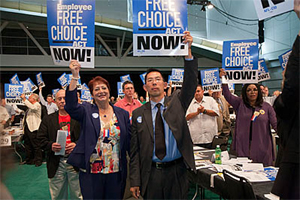NLRB Moving to Speed Union Elections

The National Labor Relations Board is readying to adopt rules that accelerate union representation elections, but staunch opposition from employers and their political allies in Washington imperils the rule—and the agency itself.
The impetus for the new rules came from the demise of the Employee Free Choice Act, which led the board to consider other ways to achieve one of EFCA's goals—speeding up union elections.
Anti-union consultants and lawyers have perfected the craft of slowing elections through objections and challenges, buying employers time to spy, bribe, and intimidate their way to defeating the union.
Last June, the NLRB published its proposals, and held public hearings and reviewed more than 65,000 comments. At its November meeting, the board decided by a 2-1 vote to draft the final language of the proposal, which could be passed by December 31.
The new rules do not go as far as those originally proposed but would still be far better than the status quo. Among other things, the original proposal would have required employers to provide unions with the phone numbers and email addresses of bargaining unit members (in addition to the names and addresses currently required).
If adopted, the amended rules would limit the number of issues that have to be resolved by the board before an election can be held, and also limit the number of internal NLRB appeals that can be pursued before an election.
In short, the rules would postpone much of the litigation that under current procedures can block representation elections for many weeks or months.
Employers fighting union organizing efforts often initiate pre-election challenges to the NLRB vote for the simple purpose of delay, to give themselves more time to “educate” their employees about the dangers of unionizing or to intimidate them into voting no.
A June study by university researchers Kate Bronfenbrenner and Dorian Warren showed that four of every five union elections in 2009 took at least a month. Ten percent took more than two months.
Unions now attempt half as many NLRB elections as a decade ago, and some avoid board elections altogether.
Fixing the Mess
The new rules would not solve all the problems with representation elections that put unions at a disadvantage. For example, employers will still have almost unlimited access to their employees for anti-union “captive audience” speeches without any equal time for union supporters, and the NLRB's remedies for employer intimidation tactics are still too weak and too slow in coming.
Some of the changes needed to give unions a truly fair shake in NLRB elections require Congress to enact new laws, like the Employee Free Choice Act. Until that happens, the NLRB has to operate with the framework of the current law, without the power to make all the necessary changes on its own.
Nevertheless, within that framework, the NLRB's proposed rules will be a significant, if limited, improvement on the current mess.
Delay Could Be Death

SUPPORT LABOR NOTES
BECOME A MONTHLY DONOR
Give $10 a month or more and get our "Fight the Boss, Build the Union" T-shirt.
But the board must act quickly on its proposal or it might find itself unable to act at all.
At full strength the NLRB has five members. But because of political gridlock in Washington that has blocked Senate approval of President Barack Obama's nominees to fill vacancies, the current board has only three members, and one of those, Craig Becker, will depart at the end of December when his temporary appointment expires.
The last time the NLRB tried to operate with only two members, the Supreme Court blocked it, ruling in 2010 that the board needs a three-member quorum to take action.
So the board must act before Becker steps down.
The quorum issue became an even greater threat to the new election rules in November, when Republican NLRB member Brian E. Hayes—who is already on record opposing the proposed election rules—threatened to resign, thus destroying the three-member quorum even before the expiration of Becker's term.
Hayes claimed that even with a three-member quorum, the NLRB has traditionally not adopted major changes supported by only two members. He said the two Democrats on the board were trying to rush through the revised proposal.
NLRB Chair Mark Pearce, one of two Democrats on the board, responded that “no rule has to wait for a dissent.” He also pointed out that the board's practice of not making major policy changes supported by only two members has applied to unfair labor practices, not to rulemaking.
For the moment, Hayes has backed off his threat to resign, indicating that he does not consider himself an “obstructionist.”
In a related twist, the House of Representatives last week passed a bill that would tie the NLRB’s hands when it comes to speeding up representation elections. The bill would require a minimum 35-day delay before an election could be held.
The gambit fits into a pattern of harassment Republican lawmakers have aimed at the NLRB in recent months, including subpoenaing NLRB officials, dragging them before hearings, and introducing several bills stripping the board’s funding and undermining its purpose—to support collective bargaining.
The House’s attack on union elections, however, is not expected to pass the Democrat-controlled Senate.
Michael J. Goldberg teaches at the Widener University School of Law in Delaware.



